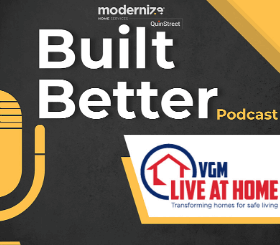As a contractor, maintaining your client relationships is one of the most important parts of day-to-day work. From the very first consultation to the final sign-off meeting and everything in between, your client meetings will either make or break your professional relationship. If you want to keep the lines of communication open, clear, and positive, preparation and organization are key.
Here are 6 of our top tips to help you prepare for appointments with clients.

Initial meeting essentials
The first time you meet with a potential client, there will be plenty of things to discuss. Once you’ve secured a new lead, they will undoubtedly have questions about your qualifications, references, and past experience. If you want to be prepared for these kinds of questions, it’s a good idea to keep a folder or file with copies of your latest achievements and references handy whenever you meet with new clients.
You should also be prepared to discuss the basic costs of your services, including your pricing structure, incidentals, and any other one-off costs. This way, you can discuss your client’s financial needs by referencing your usual price plans and spreadsheets.
Once you’ve secured a new lead and know the ins and outs of their request, you can work out a broad outline for their building project that includes:
- A timeline of work stages – including which portions of the job will be completed when and how long each stage should take
- A comprehensive price breakdown
- A list of incidentals – mentioning best and worst case scenarios to help prepare for any eventuality
- A typed contract, finalized and ready for signing
Pre-meeting preparations
Before each consecutive meeting with a client, you should make sure you are up to speed with the building project by consulting with architects, subcontractors, and anyone else involved. Once you have their updates, you can come to your appointment with a clear idea of how the project is progressing and the next steps for both you and your clients.
Because your time is valuable, you should plan to arrive at each subsequent client meeting with a detailed agenda; even if you don’t share this with your clients, it will help you stay on track. If there is any paperwork to review or sign, don’t forget to print off enough copies for everyone to save time and hassle. Finally, remember to take notes throughout the meeting: bullet points are fine, but remember to write down any actionable points as soon as you discuss them to avoid forgetting them later. If you need help with this final point, consider using an audio recorder or note taking app to streamline this process and avoid confusion.

Progress reports
The first thing that most clients will be looking for during an appointment will be a progress report of their building project. While every job is different, this report will probably contain most of the following information:
- Current timescale
- Updated budget
- Any subcontractor notes
As all contractors know, a happy client is one who is kept in the loop throughout a building project. You can also bolster the effectiveness of these progress reports by including photos and videos of the current state of their project or by sending out regular updates via smartphone app, email, or text. If your clients have regular access to this data, they will feel more comfortable during your appointments and will be more likely to trust the process.
Budget updates
Talking about money during a meeting with clients may not be the most exciting prospect, but it is necessary and expected—especially when building projects don’t go to plan. When discussing finances with your clients, make sure your facts and figures are all correct and up to date and try to be as clear as possible to avoid any issues later on down the line. If you need some help keeping your data all in one place, you can use construction management software or other financial programs to collate and store this information and save you time.
Delays and project issues
Because some construction jobs are unpredictable, it is essential that you remain transparent about the current state of your client’s project during a progress report meeting. Before your meeting, take note of any potential delays and project issues, such as:
- Time delays
- Budget overspends
- Access issues
- Building and planning permissions
If these are written down ahead of time, you can communicate them clearly but sensitively to your clients. Offering concrete solutions to the problems that come up will keep your clients happy while allowing the project to progress with as few issues as possible.
Question time
Although you may want to keep your appointments as brief as possible, you should always leave a few minutes at the end of each meeting to give your clients time to ask questions. Listening to your clients is just as important as completing their building project, so you can spare a few minutes to hear and respond to their concerns.
By taking time for preparation and planning, you can turn stressful and time-consuming client meetings into pleasant experiences that boost your customer service rating and help your business grow.

















